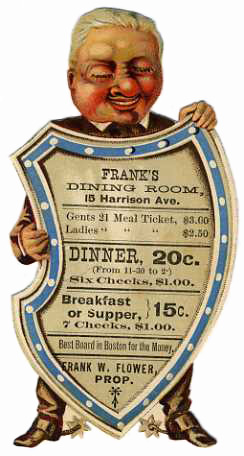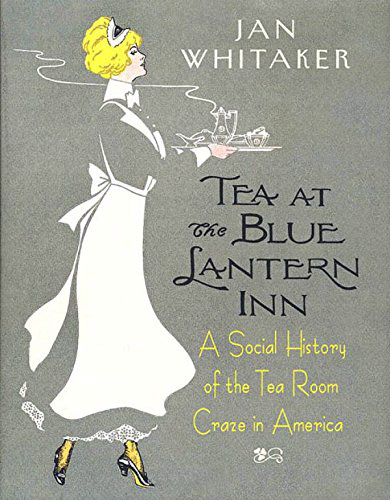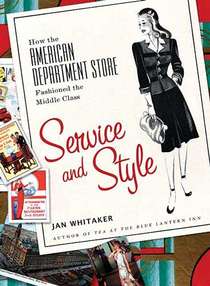 Everyone knows that being a restaurant proprietor is chancy. This is amply illustrated in the life of Frank Flower, born in England in 1854, and working as a Boston waiter in 1878. He staked his career as a restaurateur on Harrison Avenue in Boston where he ran a restaurant from about 1880 to 1895, moving twice.
Everyone knows that being a restaurant proprietor is chancy. This is amply illustrated in the life of Frank Flower, born in England in 1854, and working as a Boston waiter in 1878. He staked his career as a restaurateur on Harrison Avenue in Boston where he ran a restaurant from about 1880 to 1895, moving twice.
The reason for his failure in 1895 is unknown, but it may have had something to do with shifts in the neighborhood beginning just as he opened at 13-15 Harrison in 1880. That was the year that the first property lease was made to a Chinese person in Boston, on Oxford Place, very near to Frank’s restaurant. Frank had catered to patrons whose tastes ran to fish balls and baked beans. But, little by little by the 1890s Harrison would become a business street in Boston’s Chinatown. Boston’s first Chinese restaurant would open at 36½ Harrison in 1890.
In 1882 Frank advertised that he sold a week’s worth of meal tickets to men ($3) and women ($2.50). He also had rooms for rent, both “box rooms” and “side rooms.” I remember some years ago when I read about single working people who rented small kitchenless rooms in Boston’s South End in the 19th and early 20th centuries. While visiting a friend’s apartment in that area one day, I suddenly realized that her cramped and oddly-shaped three-room apartment was in fact made up of one box room and two side rooms.
 By 1884 Frank was doing well enough to buy a nearly new 11-room Queen Anne house in Dorchester. He moved his restaurant to 19-21 Harrison about then. That location soon became problematical when the block was sold off to a developer who planned to raze the buildings and construct a large office building.
By 1884 Frank was doing well enough to buy a nearly new 11-room Queen Anne house in Dorchester. He moved his restaurant to 19-21 Harrison about then. That location soon became problematical when the block was sold off to a developer who planned to raze the buildings and construct a large office building.
That same year, 1890, Frank won the contract to feed 10,000 Civil War veterans coming to Boston for a week-long reunion. In other words, he would need to furnish about 210,000 meals in the space of a week, rather than his usual not-too-shabby 10,500.
Though he claimed he nearly went crazy making all the arrangements, Frank felt confident he could handle the job by feeding 2,000 diners in five shifts for each meal. He contracted with a local baker for bread and the all-important baked beans; bought 3,000 new plates; had all the meat delivered to his door in a refrigerated car by Armour Co. of Chicago; bought four immense boilers that would steam 2,400 eggs at a time; hired 100 waiters; found a professional coffee maker who would turn 9,000 pounds of beans into endless streams of hot coffee; and paid 35 scullions to clean up. When the encampment was over the G.A.R. executive committee commended him on how well he had fed the multitude.
 Evidently the veterans were pleased with what they were served. Nonetheless, Frank’s menu, repeated each day, gives a fair idea of why Boston restaurants of that time were not known for their fine cuisine.
Evidently the veterans were pleased with what they were served. Nonetheless, Frank’s menu, repeated each day, gives a fair idea of why Boston restaurants of that time were not known for their fine cuisine.
Breakfast: cold meats, baked beans and brown bread, boiled eggs
Dinner: cold meats, baked beans and brown bread, boiled potatoes
Supper: cold meats and doughnuts
Frank’s Dining Room moved to 79 Harrison in the early 1890s, just about the same time that his original location became a Chinese store. But soon he hit the wall, declaring in 1894 that he was unable to pay his bills. His Dorchester mansion went back on the auction block.
Following his fall, he continued in the restaurant business as manager of Munro’s restaurant on Eliot Street. Always fond of boastful advertising, the irrepressible Frank took out newspaper ads claiming “1000 boarders needed” and “dinner, 20c, the finest on earth.”
In the decades after Frank left Harrison Avenue, Chinese restaurants such as the Chinese Royal and The Red Dragon took over several of his locations.
© Jan Whitaker, 2014














 It's great to hear from readers and I take time to answer queries. I can't always find what you are looking for, but I do appreciate getting thank yous no matter what the outcome.
It's great to hear from readers and I take time to answer queries. I can't always find what you are looking for, but I do appreciate getting thank yous no matter what the outcome.


